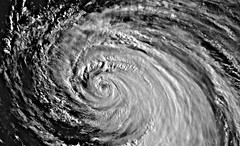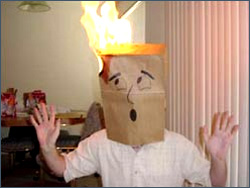Extraordinarily Ordinary - Soon I Will Be Invincible by Austin Grossman
**This is a reprint from Pop Kultr, the new blog to which I'm contributing. You should check it out. It's shiny.**
I’m a diehard fan of superheroes. While I don’t read a lot of the “capes” comics, I’m fascinated by the almost infinite power of Superman, the self-made status and limitless genius of Batman, the…uh…boobs of Wonder Woman. (Mental note: look up definition of “misogyny”). I long for the day when my brain decides to stop being lazy and taps into one of the MANY latent super powers I’m sure I contain. The day I can wave my hand and have my remote fly into it using only my mind will be the happiest day of my life. I will follow the remote pretty quickly with my phone so as to make an appointment with the cardiologist I’ll need when my new telekinetic lifestyle takes its toll.
The allure of super powers in the real world is a common one, and the primary stomping grounds of Soon I Will Be Invincible, by Austin Grossman. It deals largely with the newest world-conquering plot by its main antagonist, Doctor Impossible, and the disappearance of the world’s greatest superhero, the Superman analogue CoreFire. Doctor Impossible shares narration duties with Fatale, a cyborg and the newest member of the newest incarnation of the world’s greatest superhero team, the Champions. The two narrative threads tell the story from both the villain’s and hero’s perspective, and dovetail nicely at the end for the climactic battle.
Doctor Impossible is the smartest man in the world (he claims to have an IQ over 300), and he uses his intellect, along with a few minor powers gained from one of many lab accidents, to create vast, Rube Goldberg-ian devices with which he regularly attempts to take over the world. “Attempts” being the operative word. When the novel opens, the Doctor is in prison after the failure of his (I believe) 11th attempt at world domination, and he quickly breaks out to set in motion attempt #12. Impossible is, at heart, a nerd. He was the small kid who was too smart for his own good, who was either ignored or picked on, and who internalized every moment of pain and humiliation. Despite his multiple failures and arrests, none plague him so much as the one that should have made him a household name, but instead created CoreFire, the most powerful man in the world and the Doctor’s primary nemesis. Impossible’s ego makes itself known frequently in his passages and in the description of his past creations, but you get the sense that he’s really just trying to get the cool kids to pay attention to him, and he frequently muses as to whether he made the best choice in becoming a villian.
The other voice in the novel is one of the newest cool kids, the cyborg Fatale. Fatale was created by an independent company after a horrible traffic accident essentially destroyed half of her body. The company subsequently goes belly up, and so Fatale becomes a mercenary for the US Government so as to pay for the expensive maintenance her robotic parts require. Fatale joins the New Champions partly for the allure of working with the world’s greatest heroes, but mainly to keep herself fed and running properly. Fatale’s sections are infused with a sense of sadness. Despite the amazing things she can do, she’s still just a woman who lost her ordinary life in a horrific way, and longs for the days when she didn’t weigh 450 lbs. or when men would look at her as anything other than an oddity. Fatale is us, amazed at the wondrous beings around her, but confused and a little frightened by the extraordinary world in which she lives.
Grossman populates the books with a number of other “meta-humans” that keep the pace moving and also keep you interested in the variety of powers and abilities that exist within this world. There’s Blackwolf, the non-powered human who is this book’s version of Batman; Elphin, who claims to be a fairy; Feral, a half man-half tiger; and Damsel, who is half-alien, half-human, and one of the few heroes with inherited powers. There are numerous other minor characters mentioned in passing, but Grossman provides an index at the end of the book to keep track of who’s who and who has what powers and abilities.
Despite the presence of all these magnificent characters, Grossman keeps the book down to Earth by making most of the characters basically human in desires and limitations. Small details, like Blackwolf’s use of painkillers, or the home imprisonment and slow decline of Baron Ether, Doctor Impossible’s idol, make the book feel very real and grounded in a world we mostly understand. Grossman often references past heroic exploits as though they are common knowledge, immersing his readers in this world he’s created. And through it all is Doctor Impossible and Fatale, two (mostly) normal people gifted with amazing abilities. They are both searching for something incredibly normal: intimacy and connection. There’s a sad irony that they could each be the thing the other is looking for, but will never find because they stand on opposite sides of the law.
Ultimately, I think this is Grossman’s point. Super powers are incredible, and the things you can do with them delight the imagination. But in the end we’re all human, and all we want is someone like us to keep away the darkness. Grossman’s heroes are extraordinary, but the things that make them amazing are also the things that make them feel alone. What’s more ordinary than that?
I’m a diehard fan of superheroes. While I don’t read a lot of the “capes” comics, I’m fascinated by the almost infinite power of Superman, the self-made status and limitless genius of Batman, the…uh…boobs of Wonder Woman. (Mental note: look up definition of “misogyny”). I long for the day when my brain decides to stop being lazy and taps into one of the MANY latent super powers I’m sure I contain. The day I can wave my hand and have my remote fly into it using only my mind will be the happiest day of my life. I will follow the remote pretty quickly with my phone so as to make an appointment with the cardiologist I’ll need when my new telekinetic lifestyle takes its toll.
The allure of super powers in the real world is a common one, and the primary stomping grounds of Soon I Will Be Invincible, by Austin Grossman. It deals largely with the newest world-conquering plot by its main antagonist, Doctor Impossible, and the disappearance of the world’s greatest superhero, the Superman analogue CoreFire. Doctor Impossible shares narration duties with Fatale, a cyborg and the newest member of the newest incarnation of the world’s greatest superhero team, the Champions. The two narrative threads tell the story from both the villain’s and hero’s perspective, and dovetail nicely at the end for the climactic battle.
Doctor Impossible is the smartest man in the world (he claims to have an IQ over 300), and he uses his intellect, along with a few minor powers gained from one of many lab accidents, to create vast, Rube Goldberg-ian devices with which he regularly attempts to take over the world. “Attempts” being the operative word. When the novel opens, the Doctor is in prison after the failure of his (I believe) 11th attempt at world domination, and he quickly breaks out to set in motion attempt #12. Impossible is, at heart, a nerd. He was the small kid who was too smart for his own good, who was either ignored or picked on, and who internalized every moment of pain and humiliation. Despite his multiple failures and arrests, none plague him so much as the one that should have made him a household name, but instead created CoreFire, the most powerful man in the world and the Doctor’s primary nemesis. Impossible’s ego makes itself known frequently in his passages and in the description of his past creations, but you get the sense that he’s really just trying to get the cool kids to pay attention to him, and he frequently muses as to whether he made the best choice in becoming a villian.
The other voice in the novel is one of the newest cool kids, the cyborg Fatale. Fatale was created by an independent company after a horrible traffic accident essentially destroyed half of her body. The company subsequently goes belly up, and so Fatale becomes a mercenary for the US Government so as to pay for the expensive maintenance her robotic parts require. Fatale joins the New Champions partly for the allure of working with the world’s greatest heroes, but mainly to keep herself fed and running properly. Fatale’s sections are infused with a sense of sadness. Despite the amazing things she can do, she’s still just a woman who lost her ordinary life in a horrific way, and longs for the days when she didn’t weigh 450 lbs. or when men would look at her as anything other than an oddity. Fatale is us, amazed at the wondrous beings around her, but confused and a little frightened by the extraordinary world in which she lives.
Grossman populates the books with a number of other “meta-humans” that keep the pace moving and also keep you interested in the variety of powers and abilities that exist within this world. There’s Blackwolf, the non-powered human who is this book’s version of Batman; Elphin, who claims to be a fairy; Feral, a half man-half tiger; and Damsel, who is half-alien, half-human, and one of the few heroes with inherited powers. There are numerous other minor characters mentioned in passing, but Grossman provides an index at the end of the book to keep track of who’s who and who has what powers and abilities.
Despite the presence of all these magnificent characters, Grossman keeps the book down to Earth by making most of the characters basically human in desires and limitations. Small details, like Blackwolf’s use of painkillers, or the home imprisonment and slow decline of Baron Ether, Doctor Impossible’s idol, make the book feel very real and grounded in a world we mostly understand. Grossman often references past heroic exploits as though they are common knowledge, immersing his readers in this world he’s created. And through it all is Doctor Impossible and Fatale, two (mostly) normal people gifted with amazing abilities. They are both searching for something incredibly normal: intimacy and connection. There’s a sad irony that they could each be the thing the other is looking for, but will never find because they stand on opposite sides of the law.
Ultimately, I think this is Grossman’s point. Super powers are incredible, and the things you can do with them delight the imagination. But in the end we’re all human, and all we want is someone like us to keep away the darkness. Grossman’s heroes are extraordinary, but the things that make them amazing are also the things that make them feel alone. What’s more ordinary than that?
Labels: pop kultr, reviews, superheroes






0 Comments:
Post a Comment
<< Home